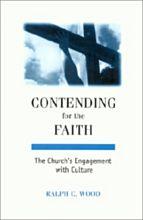
In his insightful work, Contending for the Faith, Ralph Wood writes, “H. Richard Niebuhr once said that it is much easier to declare what we oppose than what we propose, and yet that the latter is the far more important task. It’s easy enough to condemn and point out faults, but another thing entirely to remedy and to edify. Niebuhr was making a Christian no less than a common-sense claim. The Gospel is not fundamentally a word of negation, not even the negation of our own cultural sickness unto death. The Gospel is God’s vehement No to the No of humanity’s sinfulness, and thus God’s great glad Yes to his whole creation” (105).
As one who is both Reformed and Presbyterian, I find this to be an accurate critique of the very air which Reformed Presbyterians all too readily imbibe and then live out with inebriated fervor. We are so quick to critique, so ready to condemn the faults and errors of others as the self-appointed guardians of the Bible, that we end up neglecting the very Gospel we claim to defend. The truth which is to be adorned becomes smothered under a heavy blanket of censoriousness.
As one who has regretfully evidenced and experienced such a spirit, Niebuhr’s observation provides the remedy. As Reformed Presbyterian Christians, it is vitally important for us to be declaring who and what we are for, instead of so eagerly decrying those we believe to be in the wrong. Certainly there is a time and place for declaring error to be error, but what happens when that is your default disposition? You end up with curmudgeonly Christians who cannot see the wider world which God has made and redeemed.
Perhaps part of the problem that Reformed Presbys have is an inevitable result of the Reformation. After all, the likes of Martin Luther, John Calvin and John Knox were embroiled in a fight against ecclesiastical entities, and therefore had to declare wherein they disagreed with their opposition. That is our history. Furthermore, as those who have largely dieted upon Paul’s polemical epistles, is it any wonder, then, that we engage the argument with such ease? Not if we are honest.
Therefore, let us be giving ourselves all the more to the suppression of our critical spirit, and the cultivation of a humble one. Let us be about declaring Christ our King, and serving in the glorious new kingdom that has been inaugurated. For as we do so, I suspect we will be too busy being part of the solution to be delineating the shortcomings of others.